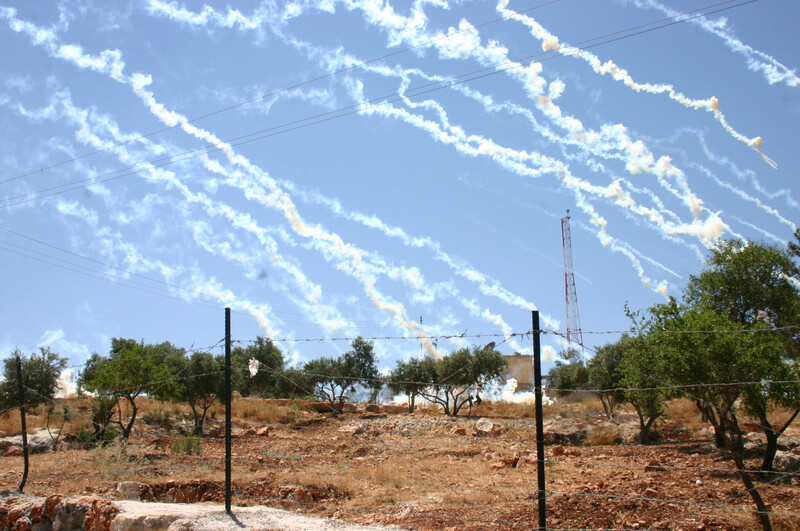The Electronic Intifada London 30 October 2012

Jibreel, the filmmaker’s youngest son, looks towards Israeli settlements from Bilin.
Anyone visiting the demonstrations against Israel’s wall in the West Bank village of Bilin over the last six years will have likely seen Emad Burnat and his camera, filming everything — anytime he was not in prison or in the hospital, at least.
Five Broken Cameras is the product of years’ worth of Burnat’s footage from these demonstrations. Co-directed by Israeli filmmaker Guy Davidi, the film takes the viewer through five years of the life of the village as the popular resistance against the wall begins.
The film is framed around the destruction of the eponymous cameras, smashed by Israeli soldiers and settlers in increasingly aggressive ways. Burnat says that one camera, with a bullet lodged inside, may even have saved his life.
While the film is similar in some ways to the 2006 documentary Bilin Habibti by Shai Carmeli-Pollak, it feels less didactic (that said, Bilin Habibti is one of my favorite films). It is certainly a lot more intimate. Burnat narrates throughout, and we have more of a window into his personal life and intimate moments with his family and friends.
Viciousness
The five broken cameras parallel the first five years in the life of Burnat’s youngest son Jibreel, who was born the year the protests began.

Tear gas projectiles saturate the sky, in a still from the film.
Peppered amongst the footage of Israeli soldiers shooting, tear-gassing and beating the protesting villagers, we see the more everyday moments of doubt and fear, along with the usual images of the Palestinian villagers’ heroic resistance.
In one scene, Burnat’s close friend Adeeb Abu Rahme gels up his hair in the mirror, trying to look his best. Burnat teasingly asks if he is going to a wedding and the reply comes in all seriousness that the protests are better than any wedding.
As well as the viciousness and sheer vindictive evil of the Israeli soldiers and settlers, there is the ridiculous situation of Israel trying to maintain the pretense of being a law-abiding state.
Israeli soldiers invade the village to kidnap people in the middle of the night, often children. In one ridiculous scene, they come to Burnat’s door and order him to stop filming, because his home has been decreed a “closed military zone” and he is not allowed to film in such a zone.
Soraya Burnat, Emad’s Brazil-raised wife, stresses out at the news of her husband’s imminent arrest. She blames Emad’s filming for bringing trouble on the family. It is difficult not to sympathize with her, given that he had already been sent to jail twice before.
A life cut short
A central character in this film is Bassem Abu Rahme, nicknamed Pheel (Arabic for elephant), on account of his tall frame. From the beginning, we see his love for life and his heroics out at the front of most demonstrations. It’s all the more wrenching, then, when we see Abu Rahme’s death from a tear gas projectile that an Israeli soldier fired directly at him.
Burnat’s son Jibreel is deeply affected: “Why did they shoot Pheel?” he asks his dad in one scene as Burnat is fixing a car. “What did he ever do to them?” Jibreel then asks Burnat why he doesn’t kill the Israeli soldiers with a knife. “They would shoot me,” Burnat replies.
“I film to heal,” Burnat explains at the film’s conclusion. “It helps me confront life.”
Five Broken Cameras is an important piece of cinema in itself. It is the chronicle of the resistance of one village. So while lacking a wider context, it succeeds on a human level, depicting a local struggle through the eyes of one Palestinian farmer with a camera and great deal of patience.
Asa Winstanley is an investigative journalist from London who has lived and worked in occupied Palestine.






Comments
5 Broken Cameras
Permalink zeyd replied on
How can I watch the documentary?... I can't seem to find it anywhere.
It’s on general release in
Permalink Asa Winstanley replied on
It’s on general release in select cinemas (in the UK at least).
The documentary was shown on
Permalink Deïr Yassin replied on
The documentary was shown on France 5 a couple of weeks ago. The journalist introduced it by saying that is was a very 'personal' and 'subjective' point of view. As if living under occupation, seeing your land being stolen, and your friends killed can be filmed objectively. Afterwards there was a discussion (that I didn't follow): one French pro-palestinian intellectual, three Zionists such as the neo-con Alexandre Adler and Guy Davidi from Jerusalem. No Palestinians.
Anyhow, no hasbara can weaken Emad Burnat's story. The music by the Trio Joubran is perfect, the colours, the land, Soraya, the kids, Bassem Abu Rahmeh, a very moving film that I encourage everyone to see.
@ Zeyd
If you don't have access to the film around where you live, and you happen to know French :-)
www.dailymotion.com/video/xu4b...
The version screened in France is 52 mts
Permalink Tim replied on
The full film is 90 mts